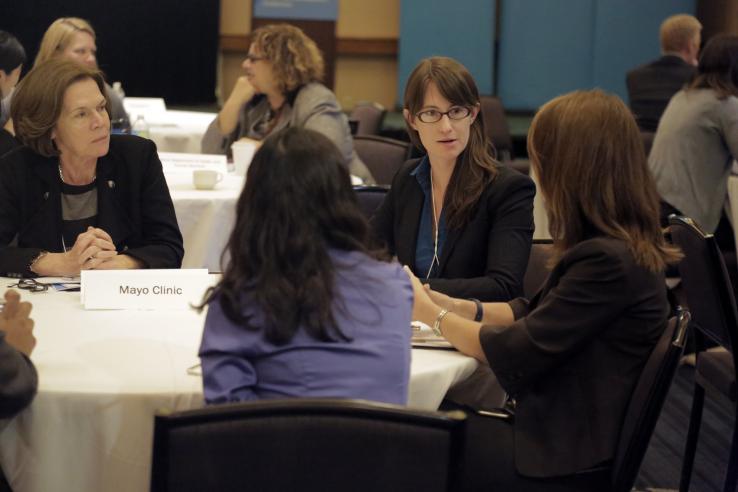
Meet the four finalists of J-PAL North America’s latest innovation competition

“It is no longer up for debate the critical impact that social determinants of health have on chronic disease, health outcomes, health care utilization, and costs.”
“[And] no one sector or organization can ‘fix’ these daunting issues, so partnerships with the community organizations who have been the long-time experts in addressing social needs are critical to do this work effectively," said Jillian Barber, Community Benefit and Health Improvement Manager at Sharp HealthCare.
A hospital within the Sharp HealthCare system, Sharp Grossmont Hospital, is one of four finalists in the most recent round of J-PAL North America’s U.S. Health Care Delivery Initiative (HCDI) Innovation Competition. The competition supports the design and implementation of randomized evaluations of promising health and social service programs to improve health outcomes and enhance the accessibility and affordability of quality health care.
Barber highlights a common theme shared by all four of this year’s finalists: the desire to address the social determinants of health—factors that can affect our health like where we live, what job we have, or the quality of the water we drink.
We talked to each of the four finalists about their programs and what they’re most interested in learning from an evaluation. Here’s what we learned:
2-1-1 San Diego in partnership with Sharp Grossmont Hospital: Connecting patients to community resources and support services
To address the social determinants of health like those mentioned above, 2-1-1 San Diego provides users with health navigation services and the Community Information Exchange (CIE), which facilitates connections to community services that can address their specific needs. They have also partnered with Sharp HealthCare to provide individualized coaching after a patient is discharged from the hospital.
Merlynda De Lira, also of Sharp HealthCare, said, “We hope this study not only will prove our collaboration with 2-1-1 San Diego is making a difference in our community but also open doors for other health care programs to budget for programs like ours in the future.”
MedZed: Leveraging telemedicine to reach high-risk patients
Five percent of people account for half of all health care costs in the United States. Yet many of these individuals' needs are not being met in traditional health care settings like a doctor’s office, requiring creative solutions to reach this vulnerable population.
MedZed developed an innovative house call program to better coordinate patient care outside of traditional settings. MedZed provides a team of nurses who visit patients in their homes and use mobile telemedicine equipment to link back to remote primary care providers (PCPs). The nurse and PCP partner with a care coordinator who follows up with patients over the phone between visits. This trio serves the patient for primary, chronic, acute, and palliative care needs.
“We are excited to bring the Patient Centered Medical Home into the patient’s own home,” said Dr. Neil Solomon, Chief Medical Officer at MedZed. “For individuals who have difficulty getting to the doctor our program has provided a great benefit. We are seeing the results through reduced admissions and ED visits, and hearing it from delighted patients. We are excited to conduct a randomized trial to measure the impact of our model.”
North Carolina Department of Health and Human Services: Public-private regional pilots
State health agencies are tasked with finding ways to most efficiently spend resources to improve health and sustainably decrease health care costs.
North Carolina’s Department of Health and Human Services (NC DHHS) is no exception. As part of transforming the state’s Medicaid program, DHHS wants to learn how to deliver the most effective health services for North Carolinians across physical, behavioral, and social needs by conducting regional pilots that employ evidence-based interventions. The goal is to take what is known from the evidence and bring that to scale on a population level.
Dr. Betsey Tilson, State Health Director and Chief Medical Officer of NC DHHS, said, “A partnership with J-PAL North America will help North Carolina rigorously test what works in the pilots, so we can invest in the most effective solutions and be good stewards of our resources going forward.”
Rush University Medical Center: Addressing psychosocial influences on health to transform the medical model
Say a patient with poorly controlled diabetes enters a doctor’s office. They could benefit from more frequent appointments, but lack consistent access to transportation. Or, maybe the patient has been feeling down and not motivated to monitor their blood sugar and could benefit from mental health support.
Situations like these are why Rush University Medical Center (RUMC) runs a program known as Ambulatory Integration of the Medical and Social (AIMS). The program embeds a social worker within primary and specialty care clinics to assess the needs of complex patients and provide tailored case management to support their specific needs.
“We hope the AIMS model will transform primary care and improve patient outcomes by addressing the social and behavioral barriers to health and wellness,” said Matt Vail, a clinical social worker at RUMC and Coordinator of RUMC’s Center for Health and Social Care Integration.
So what’s next for the finalists?
In June, representatives from each of the four organizations will participate in a kick-off workshop in Cambridge, Massachusetts. Here they will learn more about randomized evaluations and have an opportunity to meet each other and speak with experienced researchers from the J-PAL network.
Applicants who partner with a researcher from J-PAL’s network to design a high-quality randomized evaluation can jointly apply for evaluation funding.
We are excited to host these organizations in June and are looking forward to partnering with them. Congratulations!
For more information about J-PAL North America’s Health Care Delivery Initiative, visit the website or contact the US Health Care Delivery Initiative.
